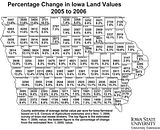Ethanol boosts farmland prices in the US
 Erupting demand for corn to make ethanol boosted the average price of cropland in Iowa to a record US$3,204 per acre (US$7917 per hectare) in 2006, according to Iowa State University's annual farmland value survey released Tuesday (webcast).
Erupting demand for corn to make ethanol boosted the average price of cropland in Iowa to a record US$3,204 per acre (US$7917 per hectare) in 2006, according to Iowa State University's annual farmland value survey released Tuesday (webcast).The price (and abundance) of farmland is one of the factors that makes investing in the biofuels industry in the global South so interesting. Compared with land markets in the EU or the US, farmland there is exceptionally competitive. Drawing on our earlier overview of land values in Africa, we recall that prices per hectare in for example Mozambique and Tanzania are estimated to be below US$100 per hectare (earlier post). In the new global energy system that is developing, biomass and land are strategic resources. Just like in the pre-fossil fuel era, control over land once again becomes a key driver of the economy. In this respect, the global South has a strategic advantage over the North.
In Iowa, farmland prices have hit record highs four years in a row. The average price of an acre of land there increased $290, up 10 percent from last year (click map). For the first time since 1941, when Iowa State began the survey, the average price of an acre of Iowa farmland topped $3,000. The higher price of corn and expectations that farmers will plant fewer soybean acres next year led to the rapid run-up in corn and soybean prices during harvest, an extremely unusual occurrence.
We've seen a tremendous spike in corn and soybean prices in the last six weeks, and that has been translated into land prices. I can't remember when it jumped so fast. This is a whole new world we are looking at. We're moving from an era of government farm program payments being the supporter of the land market and moving into the era of ethanol being the supporter. - Michael Duffy, Iowa State Extension economistOne of the effects of the higher land values is that land rental rates also are increasing. That will make it harder for beginning American farmers, who tend to be less financially able to pay higher rental rates:
 ethanol :: biodiesel :: biomass :: bioenergy :: biofuels :: energy :: sustainability :: land :: bioeconomy :: Iowa ::
ethanol :: biodiesel :: biomass :: bioenergy :: biofuels :: energy :: sustainability :: land :: bioeconomy :: Iowa :: "I'm very concerned about what we are seeing for rents," Duffy said. "Gaining access to land is becoming even more difficult for beginning farmers." The record price put the state's 32.6 million acres of farmland at a worth of about $105 billion.
"That's important because it means the overall worth of Iowa farmland owners has increased and their purchasing power has increased," Duffy said. "Iowa is an agricultural state and we should recognize that changes in land values have an impact on the state's economy."
Duffy said for the first time in years, the land survey showed the number of existing farmers buying farmland increased and the number of nonfarmer investors declined.
That's another indication that farmers are becoming more aggressive buyers because of higher crop prices and expectations that ethanol has moved farming into a new era, Duffy said.
Outside investors might have backed away from the farmland market because of potentially higher returns from the stock market and a feeling farmland prices have peaked as an investment, Duffy said.
"Farmers don't buy land as an investment," he said. "They buy land for its value as an asset. There's a different motivation there."
Duffy said the survey showed that farmland prices increased in all of Iowa's 99 counties and exceeded $4,000 an acre in seven counties. Prices topped $1,400 an acre in every county for the first time since Iowa State began conducting the survey in 1941.
More information:
Iowa State University Extension Service: 2006 Iowa Land Value Survey
Iowa State University: Iowa Farmland Value at Record Level for Fourth Year in a Row - Dec. 19, 2006.
Biopact: Land Prices in Africa - Sept. 15, 2006
 -------------------
-------------------
 Spanish company Ferry Group is to invest €42/US$55.2 million in a project for the production of biomass fuel pellets in Bulgaria.
The 3-year project consists of establishing plantations of paulownia trees near the city of Tran. Paulownia is a fast-growing tree used for the commercial production of fuel pellets.
Spanish company Ferry Group is to invest €42/US$55.2 million in a project for the production of biomass fuel pellets in Bulgaria.
The 3-year project consists of establishing plantations of paulownia trees near the city of Tran. Paulownia is a fast-growing tree used for the commercial production of fuel pellets.









0 Comments:
Post a Comment
Links to this post:
Create a Link
<< Home